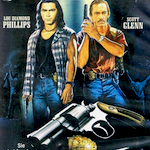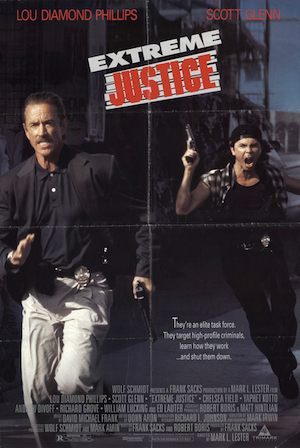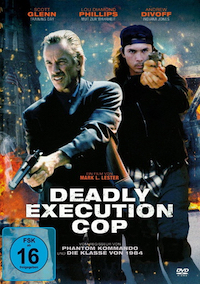 EXTREME JUSTICE is a 1993 cop movie by director Mark L. Lester (STEEL ARENA, FIRESTARTER, COMMANDO, SHOWDOWN IN LITTLE TOKYO) that you can find on DVD, VHS or streaming on Prime. Lester has done a pretty broad range of b-movie types, but one thing some of them have in common is a great sense of exaggeration. In CLASS OF 1984, for example, he presents a world where juvenile delinquency is so severe that a previously mild-mannered music teacher has no better choice than to do battle with one of his students and dump him through a skylight into the school gym during the big recital. In its sci-fi sequel CLASS OF 1999, such out-of-control kids have led to an overreaction that includes militarized robot teachers.
EXTREME JUSTICE is a 1993 cop movie by director Mark L. Lester (STEEL ARENA, FIRESTARTER, COMMANDO, SHOWDOWN IN LITTLE TOKYO) that you can find on DVD, VHS or streaming on Prime. Lester has done a pretty broad range of b-movie types, but one thing some of them have in common is a great sense of exaggeration. In CLASS OF 1984, for example, he presents a world where juvenile delinquency is so severe that a previously mild-mannered music teacher has no better choice than to do battle with one of his students and dump him through a skylight into the school gym during the big recital. In its sci-fi sequel CLASS OF 1999, such out-of-control kids have led to an overreaction that includes militarized robot teachers.
So I wasn’t sure which way he would go in his movie starring Lou Diamond Phillips (RENEGADES, UNDERTOW, THE BIG HIT) as an LAPD detective who rather than getting in trouble for his police brutality gets promoted to a secret unit where “what useta get you in trouble’ll get you a round of beers.” I guess the reason I wasn’t familiar with this one is that they were worried about releasing it a year after the L.A. riots/uprising and dumped it to HBO. But I’m happy to report it doesn’t have to be a guilty pleasure – the movie is very clearly saying that this extreme justice is too extreme and not justice. It’s not the good kind of Paul Verhoeven “you have to be really thick to not understand this satire” clear, unfortunately, but right now I’ll settle for the more accessible “he has a girlfriend who’s the conscience of the movie and convinces him that this is all wrong” type.
Phillips plays Jeff Powers, who looks like he could be in Pearl Jam with his long hair, backwards hat, leather jacket and crossbones sweatpants cutoffs. He’s introduced in a reckless car chase that makes his partner act like the uptight dean in a college sex comedy. The Lieutenant at internal affairs (L. Scott Caldwell, EXTERMINATOR 2, DEVIL IN A BLUE DRESS, GRIDIRON GANG) is not happy with him, but his former partner Dan Vaughn (Scott Glenn, MORE AMERICAN GRAFFITI, SILVERADO, FIRESTORM) shows up and invites him to a barbecue, where he recruits him to the Special Investigations Section (SIS). The other guys on the team are skeptical about Powers, but Vaughn insists he had his back when they were partners. (Which turns out to mean he covered for him.)
 It’s pretty much like a mob or bank robber movie. Powers is macho and crazy and dissatisfied with what the force will let him do, he’s welcomed into this new family where he tries to learn the ropes, he sees the appeal of their dangerous lifestyle but also, quickly, the immorality, and he’s pressured to “be a good soldier” and “not break ranks,” but realizes he has to get out, bringing him head to head with his old friend and mentor.
It’s pretty much like a mob or bank robber movie. Powers is macho and crazy and dissatisfied with what the force will let him do, he’s welcomed into this new family where he tries to learn the ropes, he sees the appeal of their dangerous lifestyle but also, quickly, the immorality, and he’s pressured to “be a good soldier” and “not break ranks,” but realizes he has to get out, bringing him head to head with his old friend and mentor.
These are the kind of macho guys who, at a barbecue, brag about who enjoys meat the rawest. And it’s the kind of police unit where the boss feels it necessary to specify that they’re not the Klan or neo-Nazis. Larson (Yaphet Kotto, FREDDY’S DEAD: THE FINAL NIGHTMARE) jokingly asks if “he killed his quota of two Black guys yet?,” which I’m not sure how to take – what is the target of his sarcasm? And that’s one of the powers of Yaphet Kotto. He can say shit like that and you’d never have the balls to ask him to clarify.
They were all worried about Powers being too much of a “cowboy,” but Larson models himself after western anti-heroes, wearing a hat, boots and duster, and when he has to fit in at Venice Beach he throws on a poncho. And he shoots first, plants weapons later.
On the job they leave Powers in the dark so that he’ll have to figure out how they operate as it happens. Their method is to follow people who the police somehow know but can’t prove are the worst criminals, and wait for them to commit felonies. Like, they follow a crew staking out a bank, and then let them do it. Go inside right before them and pretend to be customers. Vaughn casually puts in earplugs and waits for the shoot out.
One team member, Cusak (William Lucking, THE RUNDOWN) is letting the guilt get to him. He flips out after Larson kills a young female lookout, finds a gun in the car and puts it in her hand, explaining, “That’s where it would be if we were slow.” (Not even true, because the gun turns out to be empty.) Cusak cries and admits, “I just can’t do this anymore.”
Powers isn’t too happy either, angry that Vaughn just started shooting without identifying himself. Suddenly Mr. All This Red Tape is starting to see the problem. Their captain (Ed Lauter, not as openly supportive of extrajudicial executions as he was in DEATH WISH 3) says, “This isn’t some third world death squad, control that shit!” Oh, it isn’t?
Like a movie trying to justify third world death squads, Lester applies that knack for exaggeration I mentioned to a vision of extravagantly depraved criminality. That includes a trio of Mexicans who have not been busted but who the police somehow know are serial rapists. They work as a team, driving around in a van sharing both a joint and a crack pipe, and snatching up victims off the street. The SIS follow them and let them attack a woman until Powers breaks protocol by rushing in to stop them.
That they would sit back and watch crime happen is not part of the exaggeration, by the way. As the opening disclaimer explains, the SIS is an actual unit of the LAPD, and they have been criticized, in part, for allowing civilians to be endangered so they can get better arrests. The part that’s (hopefully) over the top is the scene at the morgue. Powers’ live-in-girlfriend Kelly (Chelsea Field, MASTERS OF THE UNIVERSE, DEATH SPA, HARLEY DAVIDSON AND THE MARLBORO MAN, THE LAST BOY SCOUT, THE DARK HALF) is a journalist coincidentally investigating Vaughn, so she puts on a lab coat and pretends to work there (see also: FLETCH). Most movies depict morgues as lonely places with a guy working late listening to headphones and/or eating a sandwich of indifference. This place is jumping with workers moving around horrendously mutilated bodies. The mortician notes that Vaughn killed one of these bodies, and that they see alot of his work – he sounds like a fan.
There are many hints, but not direct accusations, that racism is a factor. The cops like to joke around about each others’ race and about the department having policies against joking around about each others’ race. At an inquest only a Black councilman (Richard Allen, EYES OF A STRANGER) is skeptical of Vaughn’s claims of self defense, while a white one (Paul Ben-Victor, COOL WORLD, TRUE ROMANCE, RED SCORPION 2, POINT BLANK, EMPIRE STATE) fawningly thanks Vaughn for his service and says that questioning him is “a waste of time.” There are indications of a broken system: the white Councilman Taylor is compromised by campaign contributions from police charities, and Kelly’s generally supportive editor (Stephen Root, MONKEY SHINES, ROBOCOP 3) is too afraid of the LAPD to run a story about what Kelly has uncovered.
This is yet another case of “people in real life think cops should be able to do anything because they watch too many cop movies, yet the cop movies seem very aware that there’s a huge fucking problem.” A famous example of that is that Dirty Harry is the poster boy for we-should-give-cops-discretion-to-decide-who-bad-guys-are-and-blow-their-heads-off-for-any-reason attitudes even though his very first sequel, MAGNUM FORCE, is entirely about how dangerous that idea is. EXTREME JUSTICE seems to get compared to MAGNUM FORCE often, but a significant difference is that those were cops with a secret vigilante side hustle. This is the same thing but officially sanctioned by the LAPD and the city. (And real.)
Like Chuck Norris in CODE OF SILENCE, Powers fails to speak up publicly when he has the chance. And Vaughn tells him, “Remember, you fuck me you fuck the badge. No one’s gonna care about your reasons.” Going through official channels doesn’t work – internal affairs tells him very few officers can be prosecuted for killing unarmed people, so they don’t even try. “Shootings are not our bread and butter.” When details of an egregious case become public, instead of even pretending he cares, the captain publicly rails against the media and says, “Nobody gives a fuck what the papers say.” Sadly, all of this still seems pretty true to life 27 years later.
Powers’ last case with the SIS seems kind of like an episode of CHiPs or something – some obnoxious Michelangelo party dude types have been holding up yuppie bars with pellet guns. When Vaughn pins one down in an alley the guy taunts him, saying, “I’m 17. I’m a juvie, scrode!”

Though the details are changed, this is inspired by a case that caused some controversy for the real SIS. According to Human Rights Watch, SIS agents waited while four suspects they were surveilling held up a McDonalds in Sunland. When the suspects left the SIS blocked their car in and shot 24 shotgun rounds and 11 .45 caliber rounds at them. One attempted to run and was shot 19 times in the back. Only one survived. Officers claimed one had a gun in his hand, but a pathologist said he couldn’t have. They’d been “armed” only with empty pellet guns, which they had apparently already put back in the trunk. The families of the three who died were awarded $44 million in damages in a civil lawsuit; it was supposed to be paid by the officers and Chief Daryl Gates, but the city indemnified them and paid it instead. The department, of course, found the shooting to be justified, and the union called the whole thing a “witch hunt.”
I found a pretty detailed and interesting 1998 Los Angeles Times feature on the unit, which describes how “an embattled SIS allowed a reporter a rare glimpse into its work, night after night consenting to the observations of an outsider” and “What emerges is a portrait more flattering than that painted by its critics, yet less impeccable than that offered by its defenders.” It mentions reforms they’d made since going Judge Dredd on the pellet gun guys at McDonalds, but obviously you gotta take the “more flattering” part with a grain of salt when it comes from an embedded reporter. And a quick Google search finds that just last year they killed a guy who had held up a gas station with a BB gun, which he then threw out his car window. When they stopped him he allegedly must have been reaching for his “black cellular telephone” so “there is insufficient admissible evidence to prove beyond a reasonable doubt that the detectives did not act in lawful self-defense and defense of others.”
(These sorts of cases of course rate lower on the outrage scale than when random people who haven’t committed crimes are gunned down by cops on the streets or in their homes, but this isn’t a society that cuts off people’s hands for stealing, and it shouldn’t be one that allows these wannabe Punishers to execute them for it.)
So anyway, yeah, EXTREME JUSTICE was right. The screenplay is credited to Frank Sacks (NICO THE UNICORN, book and screenplay) and Robert Boris (ELECTRA GLIDE IN BLUE, DOCTOR DETROIT, STEELE JUSTICE, LITTLE HERCULES IN 3-D). I noticed on the credits that Spiro Razatos (of the MANIAC COP and FAST & FURIOUS franchises) is second unit director and stunt coordinator (along with Bobby J. Foxworth, Miami Vice) so that explains some crazy car chases and crashes. And it’s not on IMDb, but the credits list INSIDE MAN / IRON MAN / A STAR IS BORN / BIRDS OF PREY cinematographer Matthew Libatique as a camera assistant. This would’ve been around when he did his first short film with Darren Aranofsky. The actual cinematographer is Mark Irwin (FAST COMPANY, THE BROOD, SCANNERS, VIDEODROME, THE PROTECTOR, FRIGHT NIGHT PART 2, ROBOCOP 2, SCREAM). That might be more relevant if they ever release it in HD and the proper aspect ratio.


























September 23rd, 2020 at 11:26 am
Don’t know why I can’t stop laughing at DEADLY EXECUTION COP. That is one of the best worst titles I’ve ever heard.